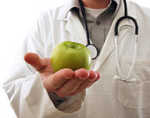Cancer and Nutrition: What You Need to Know

(NewsUSA) - Many of us know that a poor diet can wreck havoc on our bodies, but did you know that diet plays an even bigger role in cancer treatment? According to the National Cancer Institute, malnutrition is seen in as many as 40 percent of cancer-related deaths.
"Sixty-five to 70 percent of advanced cancer patients suffer some degree of malnutrition." says Dr. Pankaj Vashi, gastroenterologist and national clinical director of gastroenterology/nutrition and metabolic support for Cancer Treatment Centers of America (CTCA). "The consequences of poor nutrition are alarming: Malnourished patients have double the average length of stay in the hospital compared to well-nourished patients, and 45 percent of malnourished patients are hospitalized 20 percent longer."
How does malnutrition affect a patient's chance of achieving remission? When the body doesn't receive adequate nutrition, it struggles to tolerate chemotherapy, resulting in increased side effects. Weight loss is also a major issue in cancer patients, and even a 5 percent reduction in body weight can lead to health problems.
"Unfortunately, only 30 percent of cancer patients learn about the role of nutrition in battling their disease," says Carolyn Lammersfeld, national director of nutrition at CTCA. "Many hospitals only have one dietitian per 200 patients. Nearly two-thirds of the patients arriving to CTCA for cancer treatment are malnourished. At CTCA, the ratio is one nutritionist to every 20 patients."
Even when patients are unable to eat, the metabolic support team still uses creative methods to boost nutrition throughout treatment. The nutritionists work closely with the center's food service team to provide meals that keep patients' immune systems strong for the duration of their cancer battle. Some of the cancer-fighting super foods served include:
- Yogurt. Scientists have found that yogurt's active bacteria cultures actually help boost the immune system. Yogurt also helps supply calcium, protein and butyric acid, which serve as tools to keep patients strong during their fight.
- Cruciferous vegetables. Broccoli, brussels sprouts, kale, cabbage and cauliflower all have an active ingredient called "indoles," which research suggests may be a helpful tool for fighting cancer.
- Legumes. Including such foods as beans, peas and lentils, legumes contain fiber, folic acid, protein and cancer-fighting phytochemicals.
